Leadership and Management: Digital Technology's Impact on Thomas Cook
VerifiedAdded on 2021/01/03
|16
|5553
|403
Report
AI Summary
This report provides a comprehensive analysis of leadership and management principles, focusing on their application within the service industry, specifically using Thomas Cook as a case study. The report begins by exploring classical management theories, such as those of Weber and Fayol, and their relevance to modern business practices. It then examines the impact of digital technology on current management and leadership styles within Thomas Cook, evaluating the shift from traditional approaches to more technologically-driven strategies. The report identifies common management roles within the company, assessing how digital technology has influenced the required hard and soft skills for each role. Furthermore, it evaluates the future skills needed to adapt to ongoing technological changes and describes how digital technology has influenced change management and leadership styles within the company. The conclusion summarizes the key findings and implications of the analysis.
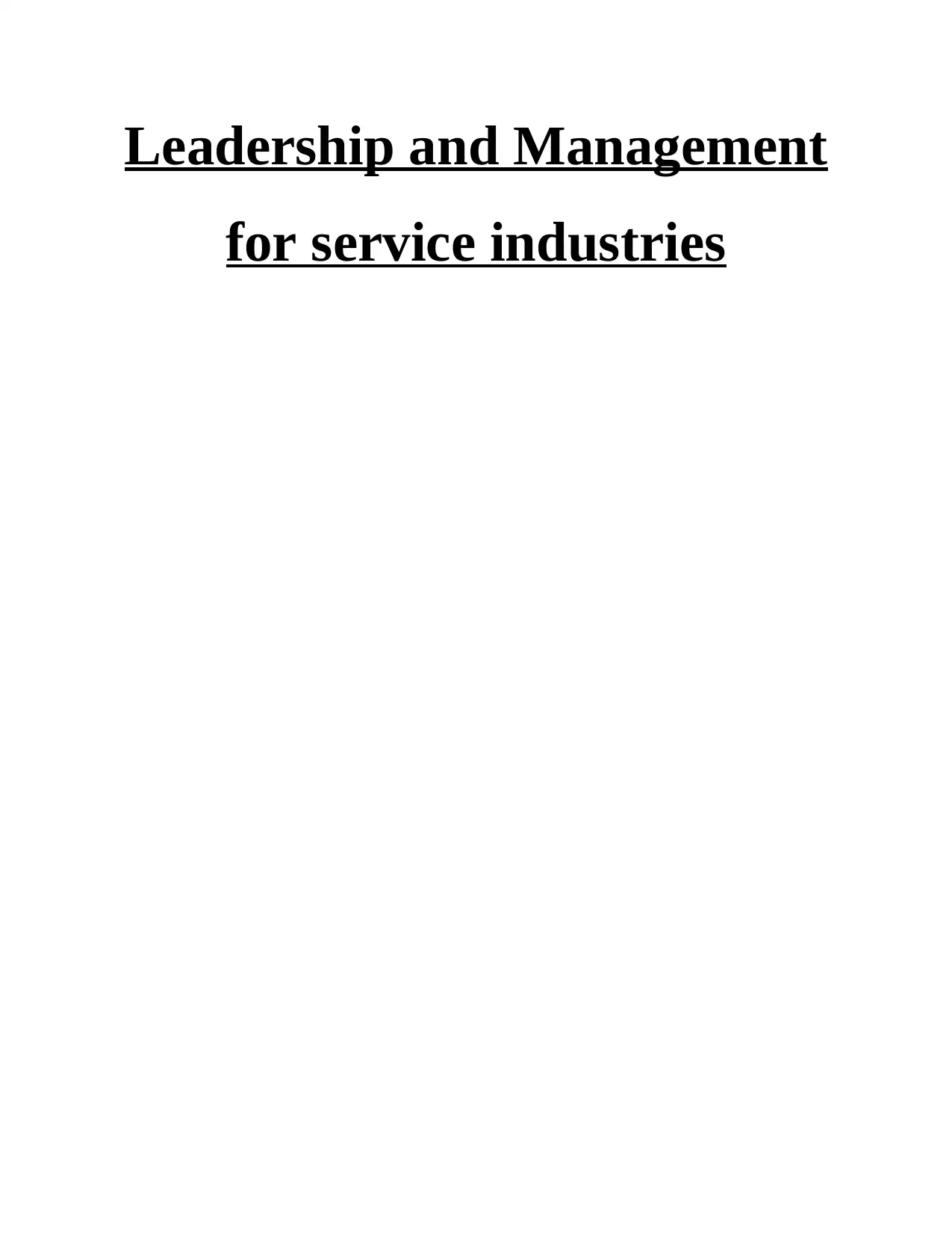
Leadership and Management
for service industries
for service industries
Paraphrase This Document
Need a fresh take? Get an instant paraphrase of this document with our AI Paraphraser
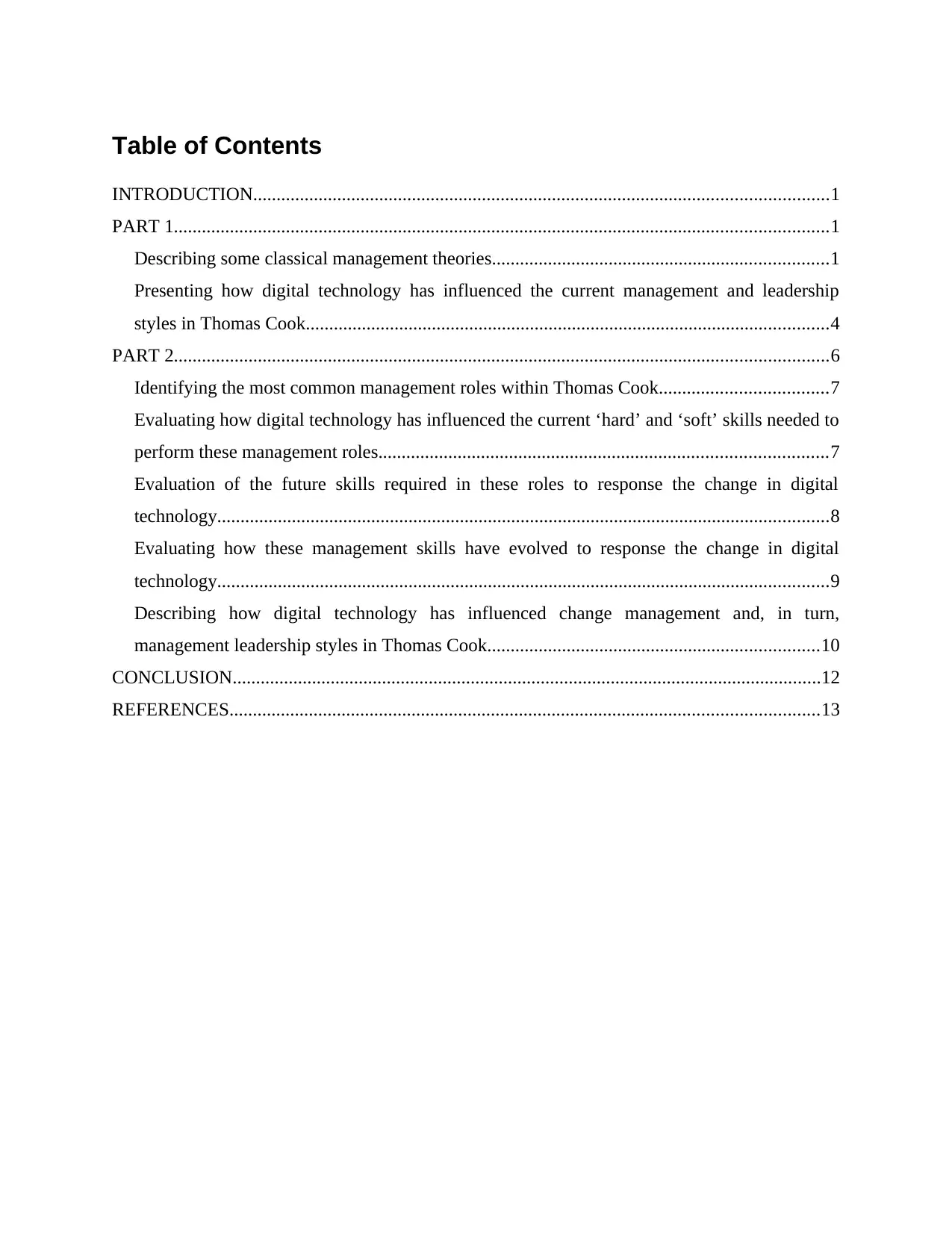
Table of Contents
INTRODUCTION...........................................................................................................................1
PART 1............................................................................................................................................1
Describing some classical management theories........................................................................1
Presenting how digital technology has influenced the current management and leadership
styles in Thomas Cook................................................................................................................4
PART 2............................................................................................................................................6
Identifying the most common management roles within Thomas Cook....................................7
Evaluating how digital technology has influenced the current ‘hard’ and ‘soft’ skills needed to
perform these management roles................................................................................................7
Evaluation of the future skills required in these roles to response the change in digital
technology...................................................................................................................................8
Evaluating how these management skills have evolved to response the change in digital
technology...................................................................................................................................9
Describing how digital technology has influenced change management and, in turn,
management leadership styles in Thomas Cook.......................................................................10
CONCLUSION..............................................................................................................................12
REFERENCES..............................................................................................................................13
INTRODUCTION...........................................................................................................................1
PART 1............................................................................................................................................1
Describing some classical management theories........................................................................1
Presenting how digital technology has influenced the current management and leadership
styles in Thomas Cook................................................................................................................4
PART 2............................................................................................................................................6
Identifying the most common management roles within Thomas Cook....................................7
Evaluating how digital technology has influenced the current ‘hard’ and ‘soft’ skills needed to
perform these management roles................................................................................................7
Evaluation of the future skills required in these roles to response the change in digital
technology...................................................................................................................................8
Evaluating how these management skills have evolved to response the change in digital
technology...................................................................................................................................9
Describing how digital technology has influenced change management and, in turn,
management leadership styles in Thomas Cook.......................................................................10
CONCLUSION..............................................................................................................................12
REFERENCES..............................................................................................................................13
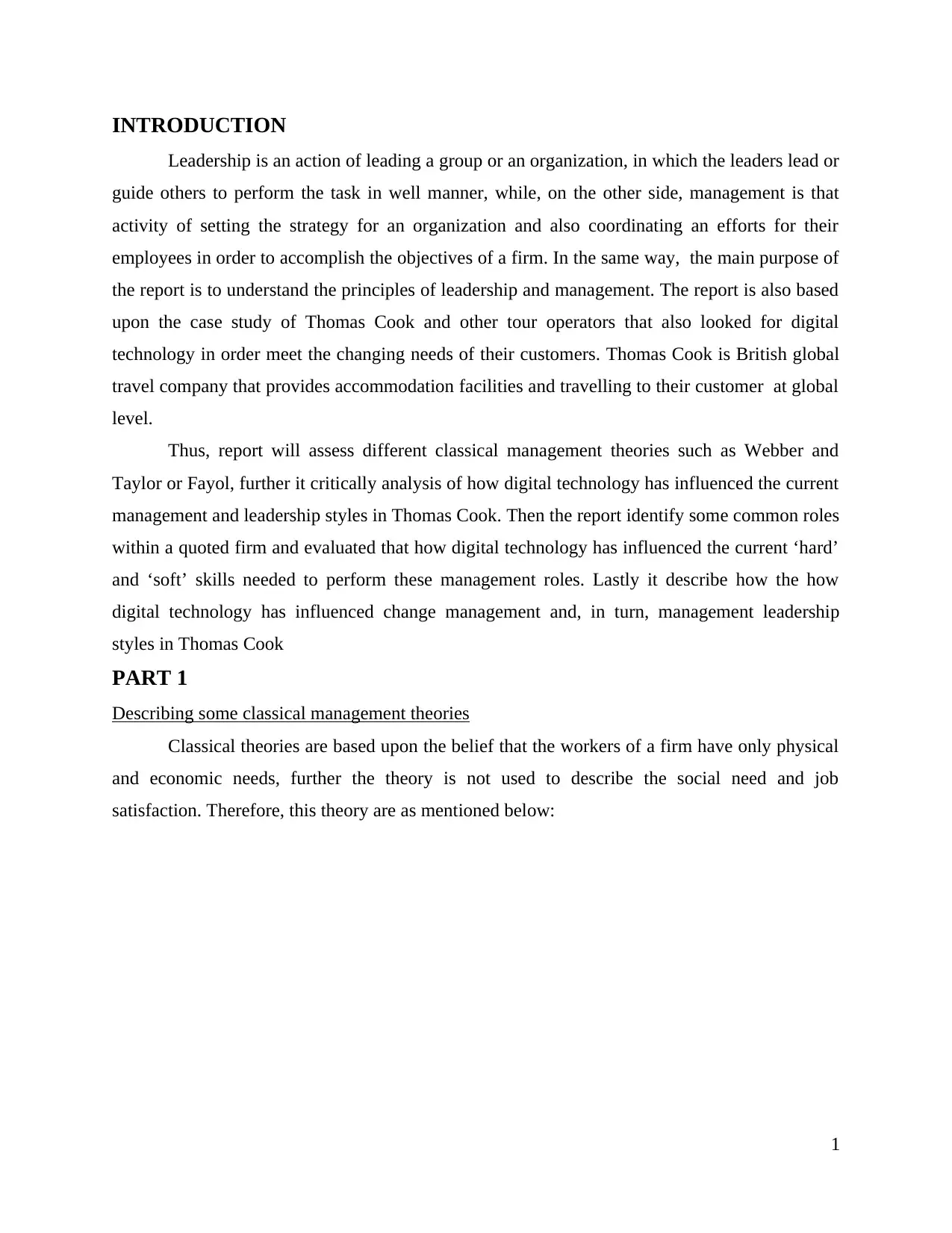
INTRODUCTION
Leadership is an action of leading a group or an organization, in which the leaders lead or
guide others to perform the task in well manner, while, on the other side, management is that
activity of setting the strategy for an organization and also coordinating an efforts for their
employees in order to accomplish the objectives of a firm. In the same way, the main purpose of
the report is to understand the principles of leadership and management. The report is also based
upon the case study of Thomas Cook and other tour operators that also looked for digital
technology in order meet the changing needs of their customers. Thomas Cook is British global
travel company that provides accommodation facilities and travelling to their customer at global
level.
Thus, report will assess different classical management theories such as Webber and
Taylor or Fayol, further it critically analysis of how digital technology has influenced the current
management and leadership styles in Thomas Cook. Then the report identify some common roles
within a quoted firm and evaluated that how digital technology has influenced the current ‘hard’
and ‘soft’ skills needed to perform these management roles. Lastly it describe how the how
digital technology has influenced change management and, in turn, management leadership
styles in Thomas Cook
PART 1
Describing some classical management theories
Classical theories are based upon the belief that the workers of a firm have only physical
and economic needs, further the theory is not used to describe the social need and job
satisfaction. Therefore, this theory are as mentioned below:
1
Leadership is an action of leading a group or an organization, in which the leaders lead or
guide others to perform the task in well manner, while, on the other side, management is that
activity of setting the strategy for an organization and also coordinating an efforts for their
employees in order to accomplish the objectives of a firm. In the same way, the main purpose of
the report is to understand the principles of leadership and management. The report is also based
upon the case study of Thomas Cook and other tour operators that also looked for digital
technology in order meet the changing needs of their customers. Thomas Cook is British global
travel company that provides accommodation facilities and travelling to their customer at global
level.
Thus, report will assess different classical management theories such as Webber and
Taylor or Fayol, further it critically analysis of how digital technology has influenced the current
management and leadership styles in Thomas Cook. Then the report identify some common roles
within a quoted firm and evaluated that how digital technology has influenced the current ‘hard’
and ‘soft’ skills needed to perform these management roles. Lastly it describe how the how
digital technology has influenced change management and, in turn, management leadership
styles in Thomas Cook
PART 1
Describing some classical management theories
Classical theories are based upon the belief that the workers of a firm have only physical
and economic needs, further the theory is not used to describe the social need and job
satisfaction. Therefore, this theory are as mentioned below:
1
⊘ This is a preview!⊘
Do you want full access?
Subscribe today to unlock all pages.

Trusted by 1+ million students worldwide
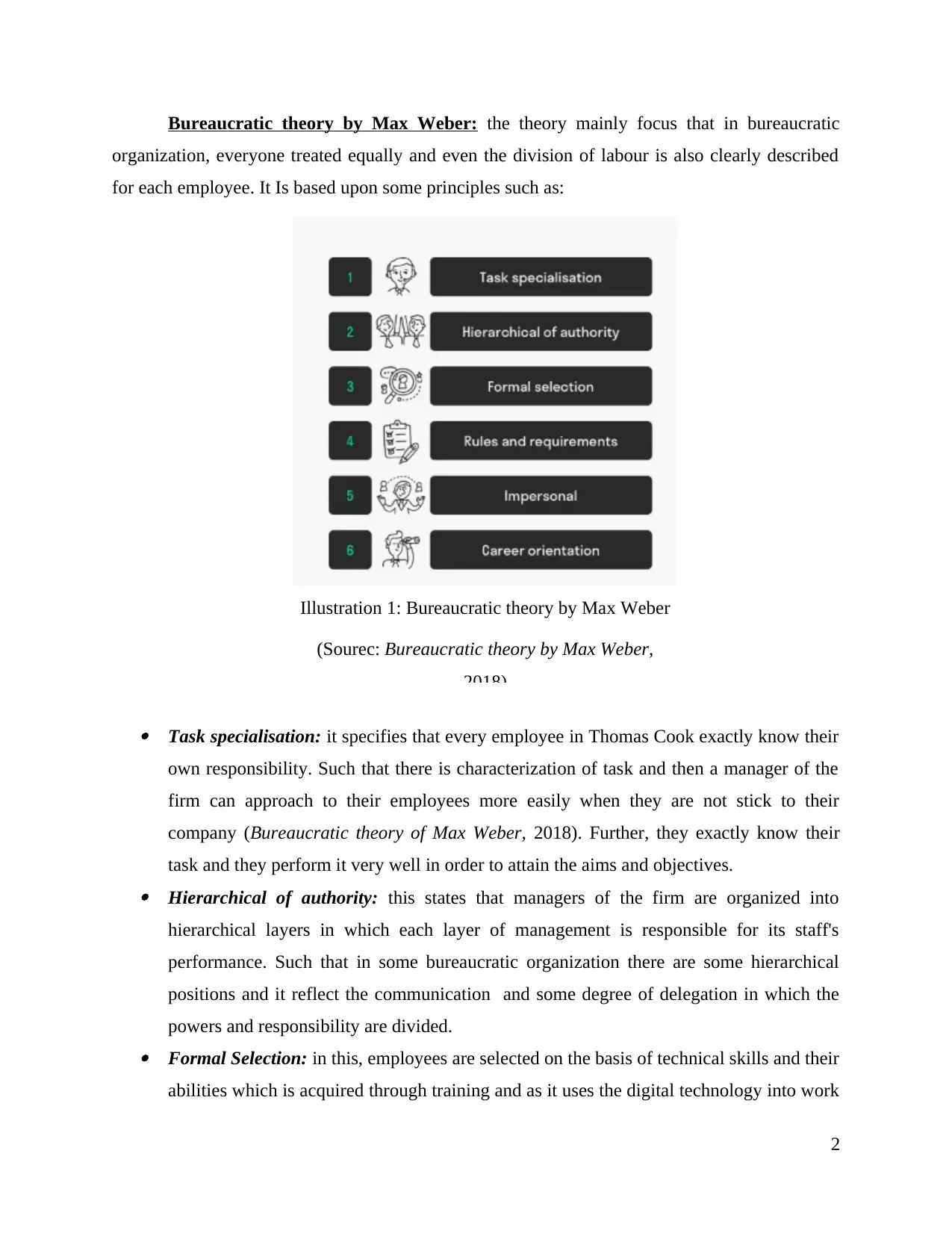
Bureaucratic theory by Max Weber: the theory mainly focus that in bureaucratic
organization, everyone treated equally and even the division of labour is also clearly described
for each employee. It Is based upon some principles such as:
Task specialisation: it specifies that every employee in Thomas Cook exactly know their
own responsibility. Such that there is characterization of task and then a manager of the
firm can approach to their employees more easily when they are not stick to their
company (Bureaucratic theory of Max Weber, 2018). Further, they exactly know their
task and they perform it very well in order to attain the aims and objectives. Hierarchical of authority: this states that managers of the firm are organized into
hierarchical layers in which each layer of management is responsible for its staff's
performance. Such that in some bureaucratic organization there are some hierarchical
positions and it reflect the communication and some degree of delegation in which the
powers and responsibility are divided. Formal Selection: in this, employees are selected on the basis of technical skills and their
abilities which is acquired through training and as it uses the digital technology into work
2
Illustration 1: Bureaucratic theory by Max Weber
(Sourec: Bureaucratic theory by Max Weber,
2018)
organization, everyone treated equally and even the division of labour is also clearly described
for each employee. It Is based upon some principles such as:
Task specialisation: it specifies that every employee in Thomas Cook exactly know their
own responsibility. Such that there is characterization of task and then a manager of the
firm can approach to their employees more easily when they are not stick to their
company (Bureaucratic theory of Max Weber, 2018). Further, they exactly know their
task and they perform it very well in order to attain the aims and objectives. Hierarchical of authority: this states that managers of the firm are organized into
hierarchical layers in which each layer of management is responsible for its staff's
performance. Such that in some bureaucratic organization there are some hierarchical
positions and it reflect the communication and some degree of delegation in which the
powers and responsibility are divided. Formal Selection: in this, employees are selected on the basis of technical skills and their
abilities which is acquired through training and as it uses the digital technology into work
2
Illustration 1: Bureaucratic theory by Max Weber
(Sourec: Bureaucratic theory by Max Weber,
2018)
Paraphrase This Document
Need a fresh take? Get an instant paraphrase of this document with our AI Paraphraser
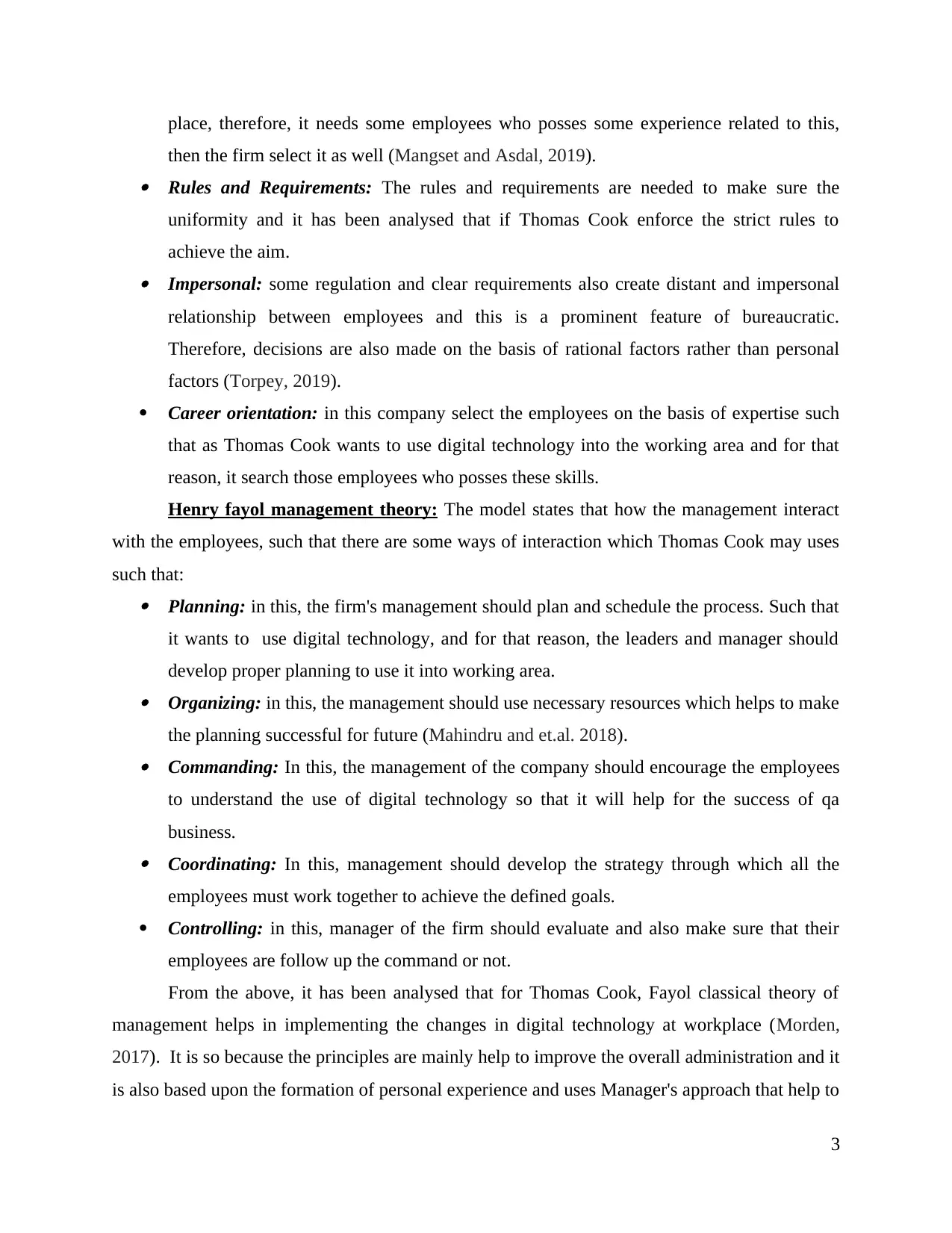
place, therefore, it needs some employees who posses some experience related to this,
then the firm select it as well (Mangset and Asdal, 2019). Rules and Requirements: The rules and requirements are needed to make sure the
uniformity and it has been analysed that if Thomas Cook enforce the strict rules to
achieve the aim. Impersonal: some regulation and clear requirements also create distant and impersonal
relationship between employees and this is a prominent feature of bureaucratic.
Therefore, decisions are also made on the basis of rational factors rather than personal
factors (Torpey, 2019).
Career orientation: in this company select the employees on the basis of expertise such
that as Thomas Cook wants to use digital technology into the working area and for that
reason, it search those employees who posses these skills.
Henry fayol management theory: The model states that how the management interact
with the employees, such that there are some ways of interaction which Thomas Cook may uses
such that: Planning: in this, the firm's management should plan and schedule the process. Such that
it wants to use digital technology, and for that reason, the leaders and manager should
develop proper planning to use it into working area. Organizing: in this, the management should use necessary resources which helps to make
the planning successful for future (Mahindru and et.al. 2018). Commanding: In this, the management of the company should encourage the employees
to understand the use of digital technology so that it will help for the success of qa
business. Coordinating: In this, management should develop the strategy through which all the
employees must work together to achieve the defined goals.
Controlling: in this, manager of the firm should evaluate and also make sure that their
employees are follow up the command or not.
From the above, it has been analysed that for Thomas Cook, Fayol classical theory of
management helps in implementing the changes in digital technology at workplace (Morden,
2017). It is so because the principles are mainly help to improve the overall administration and it
is also based upon the formation of personal experience and uses Manager's approach that help to
3
then the firm select it as well (Mangset and Asdal, 2019). Rules and Requirements: The rules and requirements are needed to make sure the
uniformity and it has been analysed that if Thomas Cook enforce the strict rules to
achieve the aim. Impersonal: some regulation and clear requirements also create distant and impersonal
relationship between employees and this is a prominent feature of bureaucratic.
Therefore, decisions are also made on the basis of rational factors rather than personal
factors (Torpey, 2019).
Career orientation: in this company select the employees on the basis of expertise such
that as Thomas Cook wants to use digital technology into the working area and for that
reason, it search those employees who posses these skills.
Henry fayol management theory: The model states that how the management interact
with the employees, such that there are some ways of interaction which Thomas Cook may uses
such that: Planning: in this, the firm's management should plan and schedule the process. Such that
it wants to use digital technology, and for that reason, the leaders and manager should
develop proper planning to use it into working area. Organizing: in this, the management should use necessary resources which helps to make
the planning successful for future (Mahindru and et.al. 2018). Commanding: In this, the management of the company should encourage the employees
to understand the use of digital technology so that it will help for the success of qa
business. Coordinating: In this, management should develop the strategy through which all the
employees must work together to achieve the defined goals.
Controlling: in this, manager of the firm should evaluate and also make sure that their
employees are follow up the command or not.
From the above, it has been analysed that for Thomas Cook, Fayol classical theory of
management helps in implementing the changes in digital technology at workplace (Morden,
2017). It is so because the principles are mainly help to improve the overall administration and it
is also based upon the formation of personal experience and uses Manager's approach that help to
3
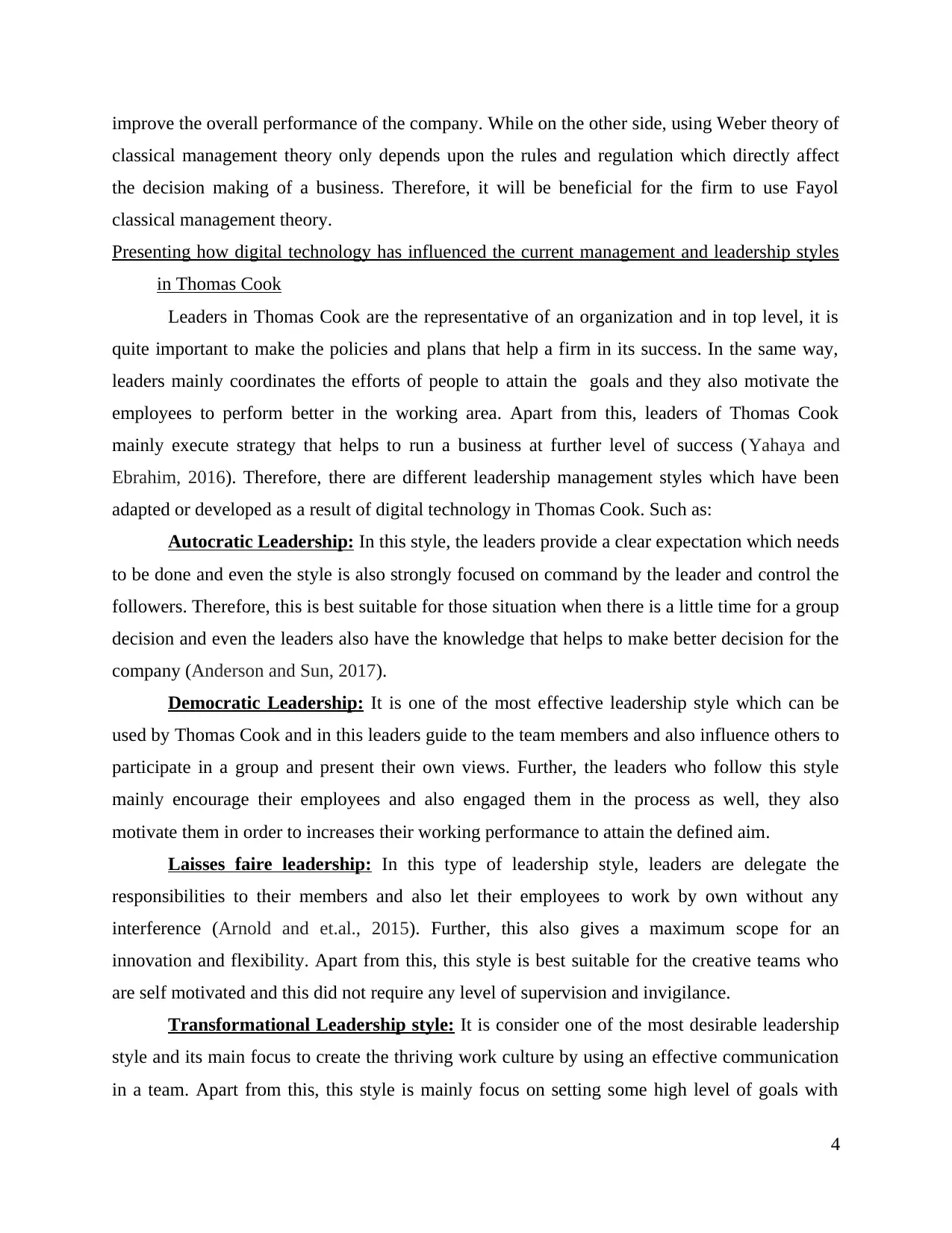
improve the overall performance of the company. While on the other side, using Weber theory of
classical management theory only depends upon the rules and regulation which directly affect
the decision making of a business. Therefore, it will be beneficial for the firm to use Fayol
classical management theory.
Presenting how digital technology has influenced the current management and leadership styles
in Thomas Cook
Leaders in Thomas Cook are the representative of an organization and in top level, it is
quite important to make the policies and plans that help a firm in its success. In the same way,
leaders mainly coordinates the efforts of people to attain the goals and they also motivate the
employees to perform better in the working area. Apart from this, leaders of Thomas Cook
mainly execute strategy that helps to run a business at further level of success (Yahaya and
Ebrahim, 2016). Therefore, there are different leadership management styles which have been
adapted or developed as a result of digital technology in Thomas Cook. Such as:
Autocratic Leadership: In this style, the leaders provide a clear expectation which needs
to be done and even the style is also strongly focused on command by the leader and control the
followers. Therefore, this is best suitable for those situation when there is a little time for a group
decision and even the leaders also have the knowledge that helps to make better decision for the
company (Anderson and Sun, 2017).
Democratic Leadership: It is one of the most effective leadership style which can be
used by Thomas Cook and in this leaders guide to the team members and also influence others to
participate in a group and present their own views. Further, the leaders who follow this style
mainly encourage their employees and also engaged them in the process as well, they also
motivate them in order to increases their working performance to attain the defined aim.
Laisses faire leadership: In this type of leadership style, leaders are delegate the
responsibilities to their members and also let their employees to work by own without any
interference (Arnold and et.al., 2015). Further, this also gives a maximum scope for an
innovation and flexibility. Apart from this, this style is best suitable for the creative teams who
are self motivated and this did not require any level of supervision and invigilance.
Transformational Leadership style: It is consider one of the most desirable leadership
style and its main focus to create the thriving work culture by using an effective communication
in a team. Apart from this, this style is mainly focus on setting some high level of goals with
4
classical management theory only depends upon the rules and regulation which directly affect
the decision making of a business. Therefore, it will be beneficial for the firm to use Fayol
classical management theory.
Presenting how digital technology has influenced the current management and leadership styles
in Thomas Cook
Leaders in Thomas Cook are the representative of an organization and in top level, it is
quite important to make the policies and plans that help a firm in its success. In the same way,
leaders mainly coordinates the efforts of people to attain the goals and they also motivate the
employees to perform better in the working area. Apart from this, leaders of Thomas Cook
mainly execute strategy that helps to run a business at further level of success (Yahaya and
Ebrahim, 2016). Therefore, there are different leadership management styles which have been
adapted or developed as a result of digital technology in Thomas Cook. Such as:
Autocratic Leadership: In this style, the leaders provide a clear expectation which needs
to be done and even the style is also strongly focused on command by the leader and control the
followers. Therefore, this is best suitable for those situation when there is a little time for a group
decision and even the leaders also have the knowledge that helps to make better decision for the
company (Anderson and Sun, 2017).
Democratic Leadership: It is one of the most effective leadership style which can be
used by Thomas Cook and in this leaders guide to the team members and also influence others to
participate in a group and present their own views. Further, the leaders who follow this style
mainly encourage their employees and also engaged them in the process as well, they also
motivate them in order to increases their working performance to attain the defined aim.
Laisses faire leadership: In this type of leadership style, leaders are delegate the
responsibilities to their members and also let their employees to work by own without any
interference (Arnold and et.al., 2015). Further, this also gives a maximum scope for an
innovation and flexibility. Apart from this, this style is best suitable for the creative teams who
are self motivated and this did not require any level of supervision and invigilance.
Transformational Leadership style: It is consider one of the most desirable leadership
style and its main focus to create the thriving work culture by using an effective communication
in a team. Apart from this, this style is mainly focus on setting some high level of goals with
4
⊘ This is a preview!⊘
Do you want full access?
Subscribe today to unlock all pages.

Trusted by 1+ million students worldwide
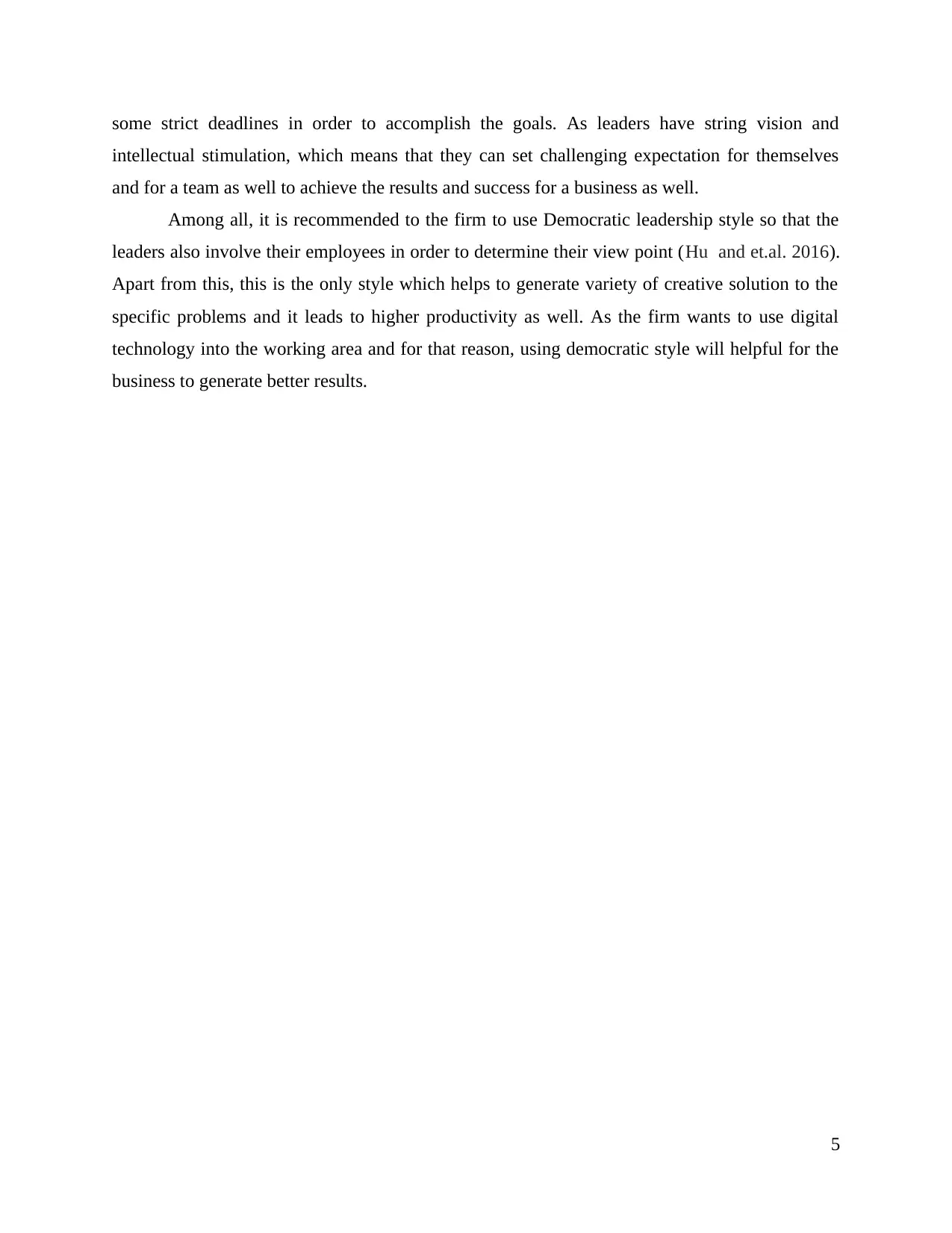
some strict deadlines in order to accomplish the goals. As leaders have string vision and
intellectual stimulation, which means that they can set challenging expectation for themselves
and for a team as well to achieve the results and success for a business as well.
Among all, it is recommended to the firm to use Democratic leadership style so that the
leaders also involve their employees in order to determine their view point (Hu and et.al. 2016).
Apart from this, this is the only style which helps to generate variety of creative solution to the
specific problems and it leads to higher productivity as well. As the firm wants to use digital
technology into the working area and for that reason, using democratic style will helpful for the
business to generate better results.
5
intellectual stimulation, which means that they can set challenging expectation for themselves
and for a team as well to achieve the results and success for a business as well.
Among all, it is recommended to the firm to use Democratic leadership style so that the
leaders also involve their employees in order to determine their view point (Hu and et.al. 2016).
Apart from this, this is the only style which helps to generate variety of creative solution to the
specific problems and it leads to higher productivity as well. As the firm wants to use digital
technology into the working area and for that reason, using democratic style will helpful for the
business to generate better results.
5
Paraphrase This Document
Need a fresh take? Get an instant paraphrase of this document with our AI Paraphraser
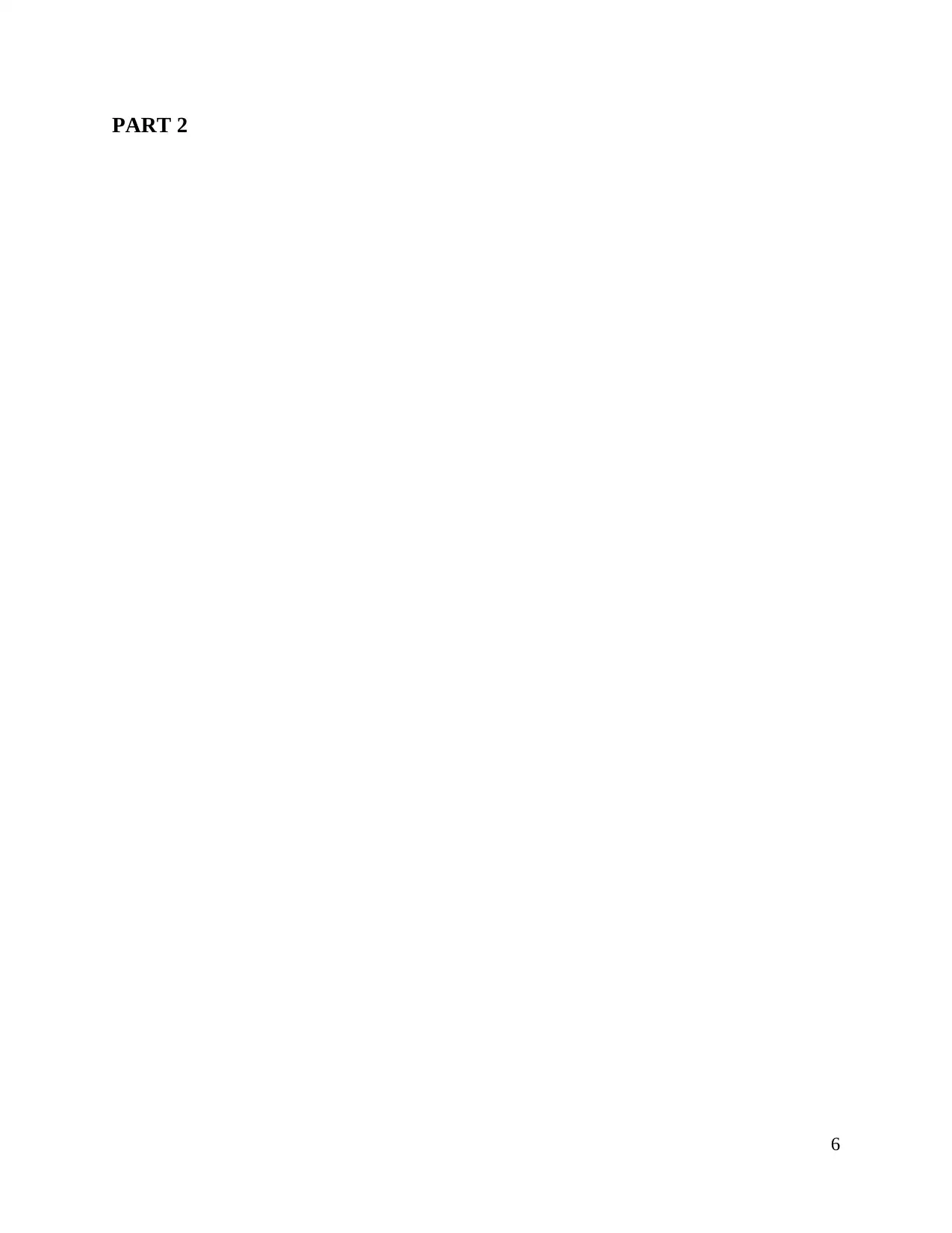
PART 2
6
6
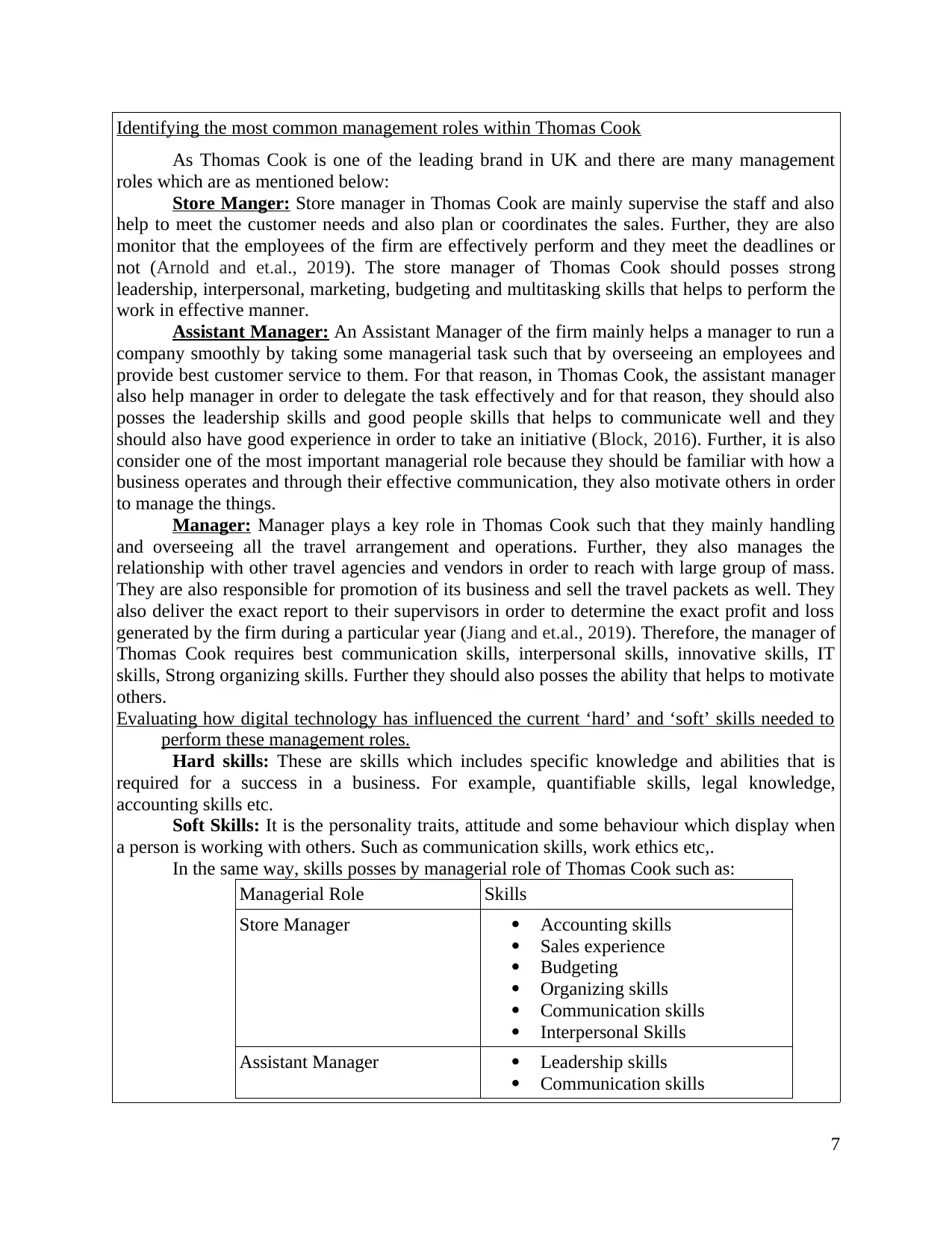
Identifying the most common management roles within Thomas Cook
As Thomas Cook is one of the leading brand in UK and there are many management
roles which are as mentioned below:
Store Manger: Store manager in Thomas Cook are mainly supervise the staff and also
help to meet the customer needs and also plan or coordinates the sales. Further, they are also
monitor that the employees of the firm are effectively perform and they meet the deadlines or
not (Arnold and et.al., 2019). The store manager of Thomas Cook should posses strong
leadership, interpersonal, marketing, budgeting and multitasking skills that helps to perform the
work in effective manner.
Assistant Manager: An Assistant Manager of the firm mainly helps a manager to run a
company smoothly by taking some managerial task such that by overseeing an employees and
provide best customer service to them. For that reason, in Thomas Cook, the assistant manager
also help manager in order to delegate the task effectively and for that reason, they should also
posses the leadership skills and good people skills that helps to communicate well and they
should also have good experience in order to take an initiative (Block, 2016). Further, it is also
consider one of the most important managerial role because they should be familiar with how a
business operates and through their effective communication, they also motivate others in order
to manage the things.
Manager: Manager plays a key role in Thomas Cook such that they mainly handling
and overseeing all the travel arrangement and operations. Further, they also manages the
relationship with other travel agencies and vendors in order to reach with large group of mass.
They are also responsible for promotion of its business and sell the travel packets as well. They
also deliver the exact report to their supervisors in order to determine the exact profit and loss
generated by the firm during a particular year (Jiang and et.al., 2019). Therefore, the manager of
Thomas Cook requires best communication skills, interpersonal skills, innovative skills, IT
skills, Strong organizing skills. Further they should also posses the ability that helps to motivate
others.
Evaluating how digital technology has influenced the current ‘hard’ and ‘soft’ skills needed to
perform these management roles.
Hard skills: These are skills which includes specific knowledge and abilities that is
required for a success in a business. For example, quantifiable skills, legal knowledge,
accounting skills etc.
Soft Skills: It is the personality traits, attitude and some behaviour which display when
a person is working with others. Such as communication skills, work ethics etc,.
In the same way, skills posses by managerial role of Thomas Cook such as:
Managerial Role Skills
Store Manager Accounting skills
Sales experience
Budgeting
Organizing skills
Communication skills
Interpersonal Skills
Assistant Manager Leadership skills
Communication skills
7
As Thomas Cook is one of the leading brand in UK and there are many management
roles which are as mentioned below:
Store Manger: Store manager in Thomas Cook are mainly supervise the staff and also
help to meet the customer needs and also plan or coordinates the sales. Further, they are also
monitor that the employees of the firm are effectively perform and they meet the deadlines or
not (Arnold and et.al., 2019). The store manager of Thomas Cook should posses strong
leadership, interpersonal, marketing, budgeting and multitasking skills that helps to perform the
work in effective manner.
Assistant Manager: An Assistant Manager of the firm mainly helps a manager to run a
company smoothly by taking some managerial task such that by overseeing an employees and
provide best customer service to them. For that reason, in Thomas Cook, the assistant manager
also help manager in order to delegate the task effectively and for that reason, they should also
posses the leadership skills and good people skills that helps to communicate well and they
should also have good experience in order to take an initiative (Block, 2016). Further, it is also
consider one of the most important managerial role because they should be familiar with how a
business operates and through their effective communication, they also motivate others in order
to manage the things.
Manager: Manager plays a key role in Thomas Cook such that they mainly handling
and overseeing all the travel arrangement and operations. Further, they also manages the
relationship with other travel agencies and vendors in order to reach with large group of mass.
They are also responsible for promotion of its business and sell the travel packets as well. They
also deliver the exact report to their supervisors in order to determine the exact profit and loss
generated by the firm during a particular year (Jiang and et.al., 2019). Therefore, the manager of
Thomas Cook requires best communication skills, interpersonal skills, innovative skills, IT
skills, Strong organizing skills. Further they should also posses the ability that helps to motivate
others.
Evaluating how digital technology has influenced the current ‘hard’ and ‘soft’ skills needed to
perform these management roles.
Hard skills: These are skills which includes specific knowledge and abilities that is
required for a success in a business. For example, quantifiable skills, legal knowledge,
accounting skills etc.
Soft Skills: It is the personality traits, attitude and some behaviour which display when
a person is working with others. Such as communication skills, work ethics etc,.
In the same way, skills posses by managerial role of Thomas Cook such as:
Managerial Role Skills
Store Manager Accounting skills
Sales experience
Budgeting
Organizing skills
Communication skills
Interpersonal Skills
Assistant Manager Leadership skills
Communication skills
7
⊘ This is a preview!⊘
Do you want full access?
Subscribe today to unlock all pages.

Trusted by 1+ million students worldwide
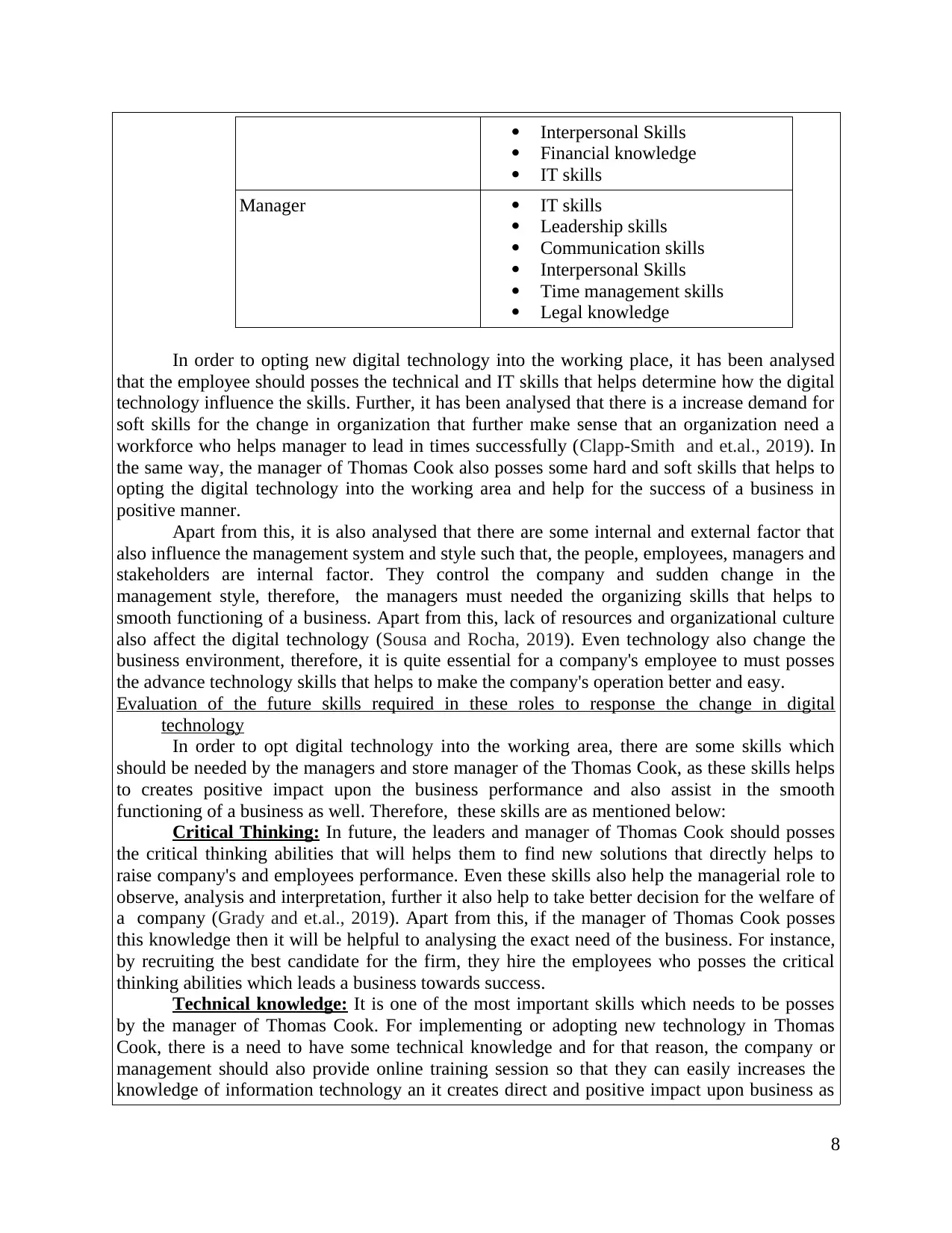
Interpersonal Skills
Financial knowledge
IT skills
Manager IT skills
Leadership skills
Communication skills
Interpersonal Skills
Time management skills
Legal knowledge
In order to opting new digital technology into the working place, it has been analysed
that the employee should posses the technical and IT skills that helps determine how the digital
technology influence the skills. Further, it has been analysed that there is a increase demand for
soft skills for the change in organization that further make sense that an organization need a
workforce who helps manager to lead in times successfully (Clapp-Smith and et.al., 2019). In
the same way, the manager of Thomas Cook also posses some hard and soft skills that helps to
opting the digital technology into the working area and help for the success of a business in
positive manner.
Apart from this, it is also analysed that there are some internal and external factor that
also influence the management system and style such that, the people, employees, managers and
stakeholders are internal factor. They control the company and sudden change in the
management style, therefore, the managers must needed the organizing skills that helps to
smooth functioning of a business. Apart from this, lack of resources and organizational culture
also affect the digital technology (Sousa and Rocha, 2019). Even technology also change the
business environment, therefore, it is quite essential for a company's employee to must posses
the advance technology skills that helps to make the company's operation better and easy.
Evaluation of the future skills required in these roles to response the change in digital
technology
In order to opt digital technology into the working area, there are some skills which
should be needed by the managers and store manager of the Thomas Cook, as these skills helps
to creates positive impact upon the business performance and also assist in the smooth
functioning of a business as well. Therefore, these skills are as mentioned below:
Critical Thinking: In future, the leaders and manager of Thomas Cook should posses
the critical thinking abilities that will helps them to find new solutions that directly helps to
raise company's and employees performance. Even these skills also help the managerial role to
observe, analysis and interpretation, further it also help to take better decision for the welfare of
a company (Grady and et.al., 2019). Apart from this, if the manager of Thomas Cook posses
this knowledge then it will be helpful to analysing the exact need of the business. For instance,
by recruiting the best candidate for the firm, they hire the employees who posses the critical
thinking abilities which leads a business towards success.
Technical knowledge: It is one of the most important skills which needs to be posses
by the manager of Thomas Cook. For implementing or adopting new technology in Thomas
Cook, there is a need to have some technical knowledge and for that reason, the company or
management should also provide online training session so that they can easily increases the
knowledge of information technology an it creates direct and positive impact upon business as
8
Financial knowledge
IT skills
Manager IT skills
Leadership skills
Communication skills
Interpersonal Skills
Time management skills
Legal knowledge
In order to opting new digital technology into the working place, it has been analysed
that the employee should posses the technical and IT skills that helps determine how the digital
technology influence the skills. Further, it has been analysed that there is a increase demand for
soft skills for the change in organization that further make sense that an organization need a
workforce who helps manager to lead in times successfully (Clapp-Smith and et.al., 2019). In
the same way, the manager of Thomas Cook also posses some hard and soft skills that helps to
opting the digital technology into the working area and help for the success of a business in
positive manner.
Apart from this, it is also analysed that there are some internal and external factor that
also influence the management system and style such that, the people, employees, managers and
stakeholders are internal factor. They control the company and sudden change in the
management style, therefore, the managers must needed the organizing skills that helps to
smooth functioning of a business. Apart from this, lack of resources and organizational culture
also affect the digital technology (Sousa and Rocha, 2019). Even technology also change the
business environment, therefore, it is quite essential for a company's employee to must posses
the advance technology skills that helps to make the company's operation better and easy.
Evaluation of the future skills required in these roles to response the change in digital
technology
In order to opt digital technology into the working area, there are some skills which
should be needed by the managers and store manager of the Thomas Cook, as these skills helps
to creates positive impact upon the business performance and also assist in the smooth
functioning of a business as well. Therefore, these skills are as mentioned below:
Critical Thinking: In future, the leaders and manager of Thomas Cook should posses
the critical thinking abilities that will helps them to find new solutions that directly helps to
raise company's and employees performance. Even these skills also help the managerial role to
observe, analysis and interpretation, further it also help to take better decision for the welfare of
a company (Grady and et.al., 2019). Apart from this, if the manager of Thomas Cook posses
this knowledge then it will be helpful to analysing the exact need of the business. For instance,
by recruiting the best candidate for the firm, they hire the employees who posses the critical
thinking abilities which leads a business towards success.
Technical knowledge: It is one of the most important skills which needs to be posses
by the manager of Thomas Cook. For implementing or adopting new technology in Thomas
Cook, there is a need to have some technical knowledge and for that reason, the company or
management should also provide online training session so that they can easily increases the
knowledge of information technology an it creates direct and positive impact upon business as
8
Paraphrase This Document
Need a fresh take? Get an instant paraphrase of this document with our AI Paraphraser
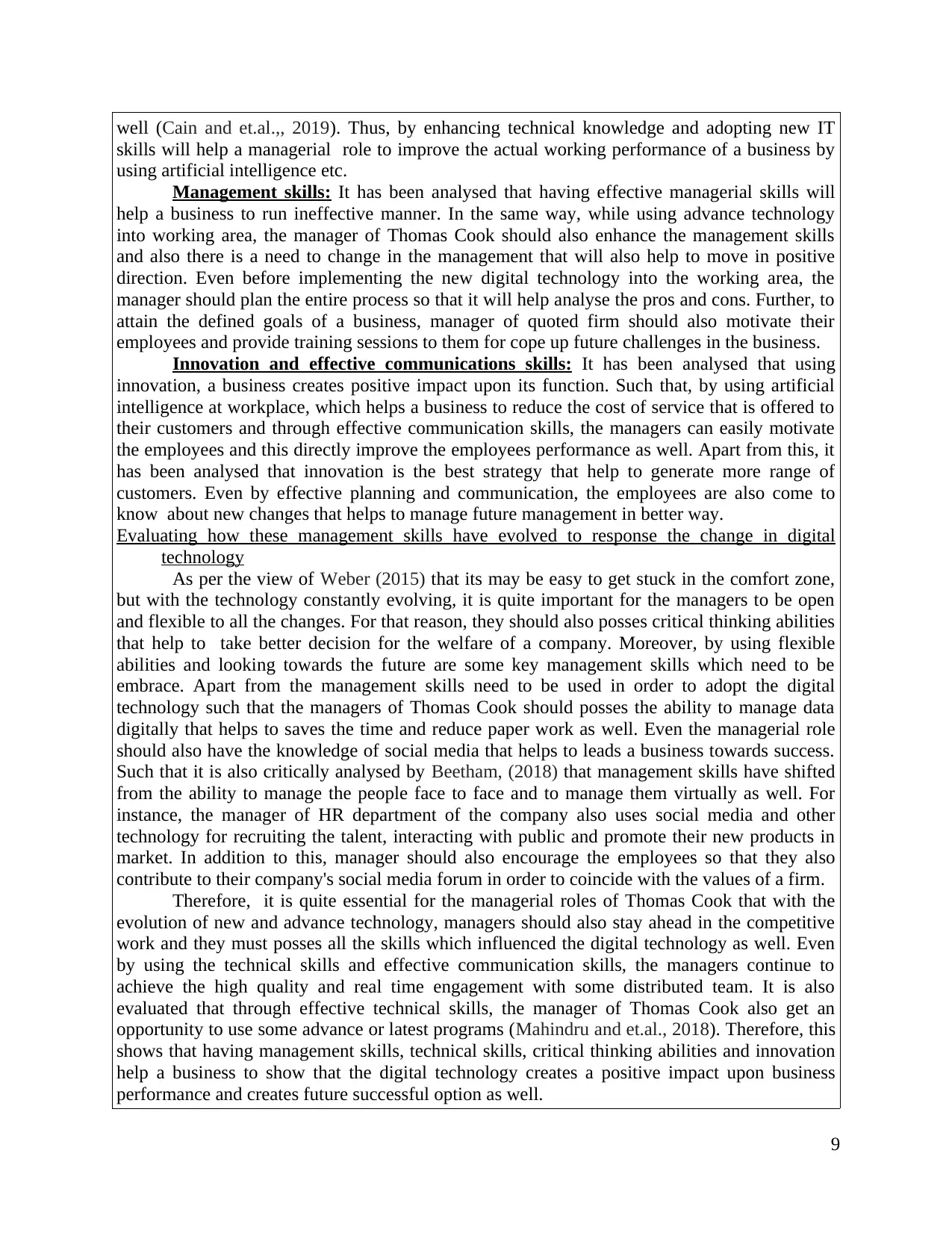
well (Cain and et.al.,, 2019). Thus, by enhancing technical knowledge and adopting new IT
skills will help a managerial role to improve the actual working performance of a business by
using artificial intelligence etc.
Management skills: It has been analysed that having effective managerial skills will
help a business to run ineffective manner. In the same way, while using advance technology
into working area, the manager of Thomas Cook should also enhance the management skills
and also there is a need to change in the management that will also help to move in positive
direction. Even before implementing the new digital technology into the working area, the
manager should plan the entire process so that it will help analyse the pros and cons. Further, to
attain the defined goals of a business, manager of quoted firm should also motivate their
employees and provide training sessions to them for cope up future challenges in the business.
Innovation and effective communications skills: It has been analysed that using
innovation, a business creates positive impact upon its function. Such that, by using artificial
intelligence at workplace, which helps a business to reduce the cost of service that is offered to
their customers and through effective communication skills, the managers can easily motivate
the employees and this directly improve the employees performance as well. Apart from this, it
has been analysed that innovation is the best strategy that help to generate more range of
customers. Even by effective planning and communication, the employees are also come to
know about new changes that helps to manage future management in better way.
Evaluating how these management skills have evolved to response the change in digital
technology
As per the view of Weber (2015) that its may be easy to get stuck in the comfort zone,
but with the technology constantly evolving, it is quite important for the managers to be open
and flexible to all the changes. For that reason, they should also posses critical thinking abilities
that help to take better decision for the welfare of a company. Moreover, by using flexible
abilities and looking towards the future are some key management skills which need to be
embrace. Apart from the management skills need to be used in order to adopt the digital
technology such that the managers of Thomas Cook should posses the ability to manage data
digitally that helps to saves the time and reduce paper work as well. Even the managerial role
should also have the knowledge of social media that helps to leads a business towards success.
Such that it is also critically analysed by Beetham, (2018) that management skills have shifted
from the ability to manage the people face to face and to manage them virtually as well. For
instance, the manager of HR department of the company also uses social media and other
technology for recruiting the talent, interacting with public and promote their new products in
market. In addition to this, manager should also encourage the employees so that they also
contribute to their company's social media forum in order to coincide with the values of a firm.
Therefore, it is quite essential for the managerial roles of Thomas Cook that with the
evolution of new and advance technology, managers should also stay ahead in the competitive
work and they must posses all the skills which influenced the digital technology as well. Even
by using the technical skills and effective communication skills, the managers continue to
achieve the high quality and real time engagement with some distributed team. It is also
evaluated that through effective technical skills, the manager of Thomas Cook also get an
opportunity to use some advance or latest programs (Mahindru and et.al., 2018). Therefore, this
shows that having management skills, technical skills, critical thinking abilities and innovation
help a business to show that the digital technology creates a positive impact upon business
performance and creates future successful option as well.
9
skills will help a managerial role to improve the actual working performance of a business by
using artificial intelligence etc.
Management skills: It has been analysed that having effective managerial skills will
help a business to run ineffective manner. In the same way, while using advance technology
into working area, the manager of Thomas Cook should also enhance the management skills
and also there is a need to change in the management that will also help to move in positive
direction. Even before implementing the new digital technology into the working area, the
manager should plan the entire process so that it will help analyse the pros and cons. Further, to
attain the defined goals of a business, manager of quoted firm should also motivate their
employees and provide training sessions to them for cope up future challenges in the business.
Innovation and effective communications skills: It has been analysed that using
innovation, a business creates positive impact upon its function. Such that, by using artificial
intelligence at workplace, which helps a business to reduce the cost of service that is offered to
their customers and through effective communication skills, the managers can easily motivate
the employees and this directly improve the employees performance as well. Apart from this, it
has been analysed that innovation is the best strategy that help to generate more range of
customers. Even by effective planning and communication, the employees are also come to
know about new changes that helps to manage future management in better way.
Evaluating how these management skills have evolved to response the change in digital
technology
As per the view of Weber (2015) that its may be easy to get stuck in the comfort zone,
but with the technology constantly evolving, it is quite important for the managers to be open
and flexible to all the changes. For that reason, they should also posses critical thinking abilities
that help to take better decision for the welfare of a company. Moreover, by using flexible
abilities and looking towards the future are some key management skills which need to be
embrace. Apart from the management skills need to be used in order to adopt the digital
technology such that the managers of Thomas Cook should posses the ability to manage data
digitally that helps to saves the time and reduce paper work as well. Even the managerial role
should also have the knowledge of social media that helps to leads a business towards success.
Such that it is also critically analysed by Beetham, (2018) that management skills have shifted
from the ability to manage the people face to face and to manage them virtually as well. For
instance, the manager of HR department of the company also uses social media and other
technology for recruiting the talent, interacting with public and promote their new products in
market. In addition to this, manager should also encourage the employees so that they also
contribute to their company's social media forum in order to coincide with the values of a firm.
Therefore, it is quite essential for the managerial roles of Thomas Cook that with the
evolution of new and advance technology, managers should also stay ahead in the competitive
work and they must posses all the skills which influenced the digital technology as well. Even
by using the technical skills and effective communication skills, the managers continue to
achieve the high quality and real time engagement with some distributed team. It is also
evaluated that through effective technical skills, the manager of Thomas Cook also get an
opportunity to use some advance or latest programs (Mahindru and et.al., 2018). Therefore, this
shows that having management skills, technical skills, critical thinking abilities and innovation
help a business to show that the digital technology creates a positive impact upon business
performance and creates future successful option as well.
9
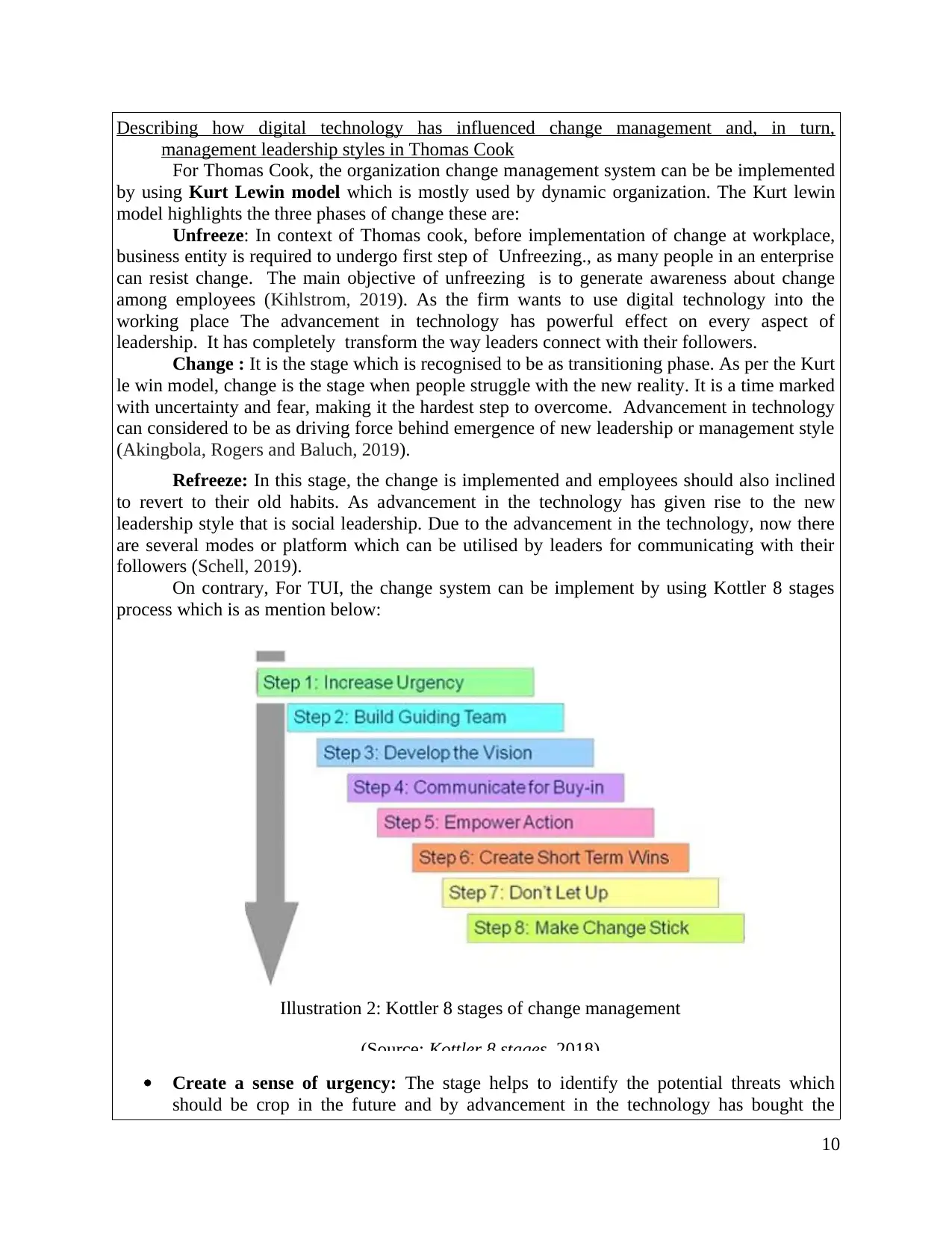
Describing how digital technology has influenced change management and, in turn,
management leadership styles in Thomas Cook
For Thomas Cook, the organization change management system can be be implemented
by using Kurt Lewin model which is mostly used by dynamic organization. The Kurt lewin
model highlights the three phases of change these are:
Unfreeze: In context of Thomas cook, before implementation of change at workplace,
business entity is required to undergo first step of Unfreezing., as many people in an enterprise
can resist change. The main objective of unfreezing is to generate awareness about change
among employees (Kihlstrom, 2019). As the firm wants to use digital technology into the
working place The advancement in technology has powerful effect on every aspect of
leadership. It has completely transform the way leaders connect with their followers.
Change : It is the stage which is recognised to be as transitioning phase. As per the Kurt
le win model, change is the stage when people struggle with the new reality. It is a time marked
with uncertainty and fear, making it the hardest step to overcome. Advancement in technology
can considered to be as driving force behind emergence of new leadership or management style
(Akingbola, Rogers and Baluch, 2019).
Refreeze: In this stage, the change is implemented and employees should also inclined
to revert to their old habits. As advancement in the technology has given rise to the new
leadership style that is social leadership. Due to the advancement in the technology, now there
are several modes or platform which can be utilised by leaders for communicating with their
followers (Schell, 2019).
On contrary, For TUI, the change system can be implement by using Kottler 8 stages
process which is as mention below:
Create a sense of urgency: The stage helps to identify the potential threats which
should be crop in the future and by advancement in the technology has bought the
10
Illustration 2: Kottler 8 stages of change management
(Source: Kottler 8 stages, 2018)
management leadership styles in Thomas Cook
For Thomas Cook, the organization change management system can be be implemented
by using Kurt Lewin model which is mostly used by dynamic organization. The Kurt lewin
model highlights the three phases of change these are:
Unfreeze: In context of Thomas cook, before implementation of change at workplace,
business entity is required to undergo first step of Unfreezing., as many people in an enterprise
can resist change. The main objective of unfreezing is to generate awareness about change
among employees (Kihlstrom, 2019). As the firm wants to use digital technology into the
working place The advancement in technology has powerful effect on every aspect of
leadership. It has completely transform the way leaders connect with their followers.
Change : It is the stage which is recognised to be as transitioning phase. As per the Kurt
le win model, change is the stage when people struggle with the new reality. It is a time marked
with uncertainty and fear, making it the hardest step to overcome. Advancement in technology
can considered to be as driving force behind emergence of new leadership or management style
(Akingbola, Rogers and Baluch, 2019).
Refreeze: In this stage, the change is implemented and employees should also inclined
to revert to their old habits. As advancement in the technology has given rise to the new
leadership style that is social leadership. Due to the advancement in the technology, now there
are several modes or platform which can be utilised by leaders for communicating with their
followers (Schell, 2019).
On contrary, For TUI, the change system can be implement by using Kottler 8 stages
process which is as mention below:
Create a sense of urgency: The stage helps to identify the potential threats which
should be crop in the future and by advancement in the technology has bought the
10
Illustration 2: Kottler 8 stages of change management
(Source: Kottler 8 stages, 2018)
⊘ This is a preview!⊘
Do you want full access?
Subscribe today to unlock all pages.

Trusted by 1+ million students worldwide
1 out of 16
Related Documents
Your All-in-One AI-Powered Toolkit for Academic Success.
+13062052269
info@desklib.com
Available 24*7 on WhatsApp / Email
![[object Object]](/_next/static/media/star-bottom.7253800d.svg)
Unlock your academic potential
Copyright © 2020–2026 A2Z Services. All Rights Reserved. Developed and managed by ZUCOL.



